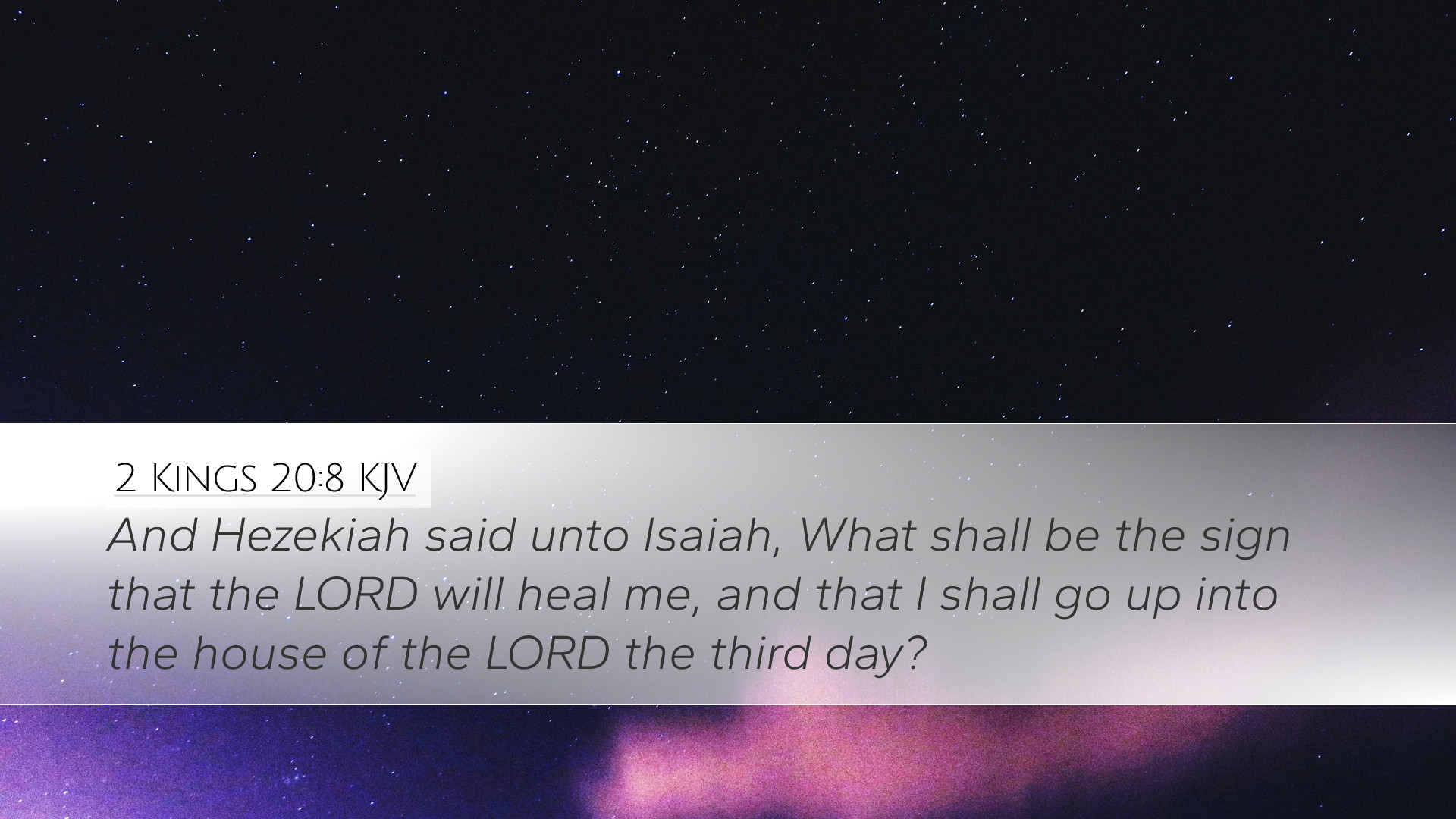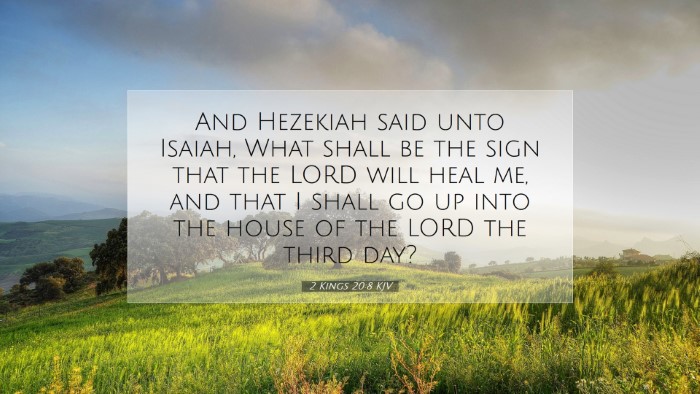Old Testament
Genesis Exodus Leviticus Numbers Deuteronomy Joshua Judges Ruth 1 Samuel 2 Samuel 1 Kings 2 Kings 1 Chronicles 2 Chronicles Ezra Nehemiah Esther Job Psalms Proverbs Ecclesiastes Song of Solomon Isaiah Jeremiah Lamentations Ezekiel Daniel Hosea Joel Amos Obadiah Jonah Micah Nahum Habakkuk Zephaniah Haggai Zechariah Malachi2 Kings 20:8
2 Kings 20:8 KJV
And Hezekiah said unto Isaiah, What shall be the sign that the LORD will heal me, and that I shall go up into the house of the LORD the third day?
2 Kings 20:8 Bible Commentary
Commentary on 2 Kings 20:8
2 Kings 20:8 states:
"And Hezekiah said to Isaiah, 'What shall be the sign that the Lord will heal me, and that I shall go up to the house of the Lord the third day?'"
Introduction
This verse occurs in a critical junction of the narrative surrounding King Hezekiah's life. After receiving a dire prophecy from the prophet Isaiah regarding his impending death, Hezekiah pleads for a sign of healing.
Contextual Background
Hezekiah's reign is marked by significant religious reform and a deep devotion to God. His encounter with death and the subsequent request for a sign reflects his faith and reliance on God's assurance.
Historical Significance
Hezekiah is one of the few kings of Judah celebrated for his faithfulness to God. His reign brought about the restoration of genuine worship and a reliance on Yahweh amidst external threats.
- King Hezekiah's Reforms: He initiated extensive reforms that included the removal of high places, idolatry, and the observance of the Passover (2 Kings 18-20).
- Assyrian Threat: His leadership and trust in God became pivotal during the siege of Jerusalem by the Assyrians (2 Kings 18:13–19:37).
Hezekiah's Request for a Sign
Hezekiah's inquiry, “What shall be the sign?” demonstrates his desire for assurance in God’s promise of healing. This request can be viewed from several perspectives:
- Expression of Faith: Hezekiah expresses faith by seeking confirmation of God’s promise. It reflects a biblical principle where signs often accompany God's declarations (Matthew Henry).
- Human Doubt: Despite his previous faithful actions, Hezekiah’s request shows a human tendency to seek tangible proof of divine assurance (Albert Barnes).
- Theological Significance: His question invites us to explore the nature of divine signs in biblical theology and their implications for understanding God's communication with humanity (Adam Clarke).
The Role of Prophecy
Isaiah’s role as a prophet is crucial at this juncture; he not only delivers dire news but also the promise of healing. This reflects the dual role of prophets in scripture: to declare judgment and offer hope.
- Divine Authority: Isaiah’s prophetic authority is established, as he communicates God's will directly (Matthew Henry).
- The Nature of Signs: The signs given reflect God's grace and mercy, exhibiting His willingness to uplift those who earnestly seek Him (Albert Barnes).
Theological Implications
This request raises significant theological themes relevant to both past and contemporary readers:
- Faith and Doubt: Hezekiah’s situation underscores the interplay between faith and doubt, a common theme in scripture. This relatability invites discussions on the nature of assurance in the Christian faith.
- Understanding God’s Will: Hezekiah’s earnest pursuit of understanding God’s will for his life encourages believers to seek clarity and assurance in their own spiritual journeys (Adam Clarke).
Pastoral Reflections
For pastors and spiritual leaders, Hezekiah’s story serves as a poignant reminder of the importance of prayer and seeking God’s direction in times of uncertainty.
- Encouragement for Prayer: Leaders are reminded to encourage congregants in their prayer life, especially when facing life-altering circumstances.
- God's Response to Human Need: Highlight God’s faithfulness in responding to the requests and cries of His people, which should instill hope and assurance within the community (Matthew Henry).
Conclusion
In summary, 2 Kings 20:8 reveals key insights about the nature of faith, the role of prophecy, and God’s willingness to reassure His people. Hezekiah’s plea for a sign signifies a larger truth about human reliance on divine promises, and it opens the door for deeper exploration of one’s relationship with God.
This passage invites believers to consider their responses to God’s challenges and promises, ensuring they are grounded in faith, especially in trying times.


